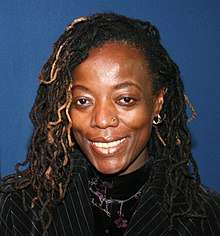
Tsitsi Dangarembga
Tsitsi Dangarembga (born February 4, 1959) is a Zimbabwean author and filmmaker.
Quotes
- The racism in England was not so institutionalized. Well, it was institutionalized, but then it was so efficiently realized that it didn’t need institutions, if you understand what I mean. In England, it was much easier not to be affected by it to that extent because my parents were students and people were somewhat respectful.
- On her experiences with racism in England in “An Interview with Tsitsi Dangarembga: An excerpt” in Brick Magazine (December 2012)
- I realize that creative women often do not fit easily into certain paradigms. I think to myself, Then where do they go? Where do they go? Because I feel that these women have so much to contribute, that they just see things in a different way. Every society has people like that and marginalizes them in some way. So it’s a very difficult situation.
- On the difficulties of being a creative woman in “An Interview with Tsitsi Dangarembga: An excerpt” in Brick Magazine (December 2012)
- The skills I had learned for prose didn’t work in film. Those telling details, they’re completely different. Or the fact of these inner monologues in which you can write a whole book. Whereas prose is teasing out, film is stripping down, concentrating and compacting. I found I could not learn the one while doing the other. So it was a big struggle, actually. It took me years.
- On adjusting to film writing in “An Interview with Tsitsi Dangarembga: An excerpt” in Brick Magazine (December 2012)
- I wrote the book just after Zimbabwe’s independence to encourage young Zimbabweans to develop themselves in spite of the challenges they would face doing so. There was also a lot of talk after independence of going back to one’s cultural roots. I wanted to interrogate that idea by examining aspects of the culture we were being told to go back to that affected women in my environment negatively. I was a newly minted feminist at the time and very eager. I also wanted to look at the ongoing effects of colonialism in the new dispensation. At the same time, I hoped to write a book that would be eminently readable, with recognizable characters.
- On what she had hoped to convey with her first novel Nervous Conditions in “A Crisis of Personhood: Tsitsi Dangarembga by Bhakti Shringarpure” in BOMB Magazine (2019 Sep 27)
External links
This article is issued from
Wikiquote.
The text is licensed under Creative
Commons - Attribution - Sharealike.
Additional terms may apply for the media files.